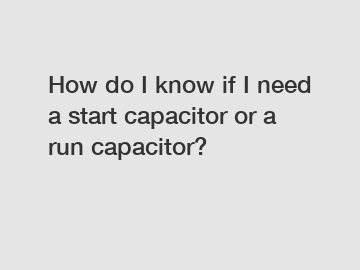How do I know if I need a start capacitor or a run capacitor?
In the world of electrical engineering and appliance repairs, understanding the intricacies of capacitors is crucial. These small but mighty devices play a pivotal role in many electrical systems, notably in motors and compressors. However, for someone less acquainted with these components, the concept of start and run capacitors can be perplexing. Fear not, as we unravel the mystery to help you identify whether your appliance requires a start capacitor or a run capacitor.
1. Capacitors: A Brief Overview:
Capacitors are passive electrical components commonly used to store and release electrical energy. They consist of two conductive plates separated by an insulating material, or dielectric. When connected to a power source, a capacitor charges with electric energy. Once charged, the capacitor can provide an instant boost of power when needed and stabilize electrical current fluctuations.

2. Key Differences: Start Capacitors vs. Run Capacitors:
Start capacitors and run capacitors may look similar, but they serve different purposes within electrical appliances. Let's delve into their unique characteristics:
2.1 Start Capacitors:
Start capacitors are primarily used in electrical motors to provide an additional burst of power during startup. They store and release energy needed to initiate the motor's rotation. As the motor gains momentum, a start capacitor then disengages, allowing the motor to run on its own power. Start capacitors often have a higher capacitance rating compared to run capacitors.
2.2 Run Capacitors:
In contrast, run capacitors work continuously while an appliance is operational. They help regulate electrical current flow, reduce power factor issues, enhance motor torque, and improve efficiency. Think of run capacitors as the backbone of a motor, providing constant energy discharges alongside the main power supply. Run capacitors typically have a lower capacitance rating than start capacitors.
3. Identifying Capacitor Types in Appliances:
Now that we understand the basic differences between start and run capacitors, let's explore some common appliances that often require one or the other:
3.1. Air Conditioners and Refrigerators:
Both air conditioning units and refrigerators depend on start capacitors to initiate motor rotation. Start capacitors assist in overcoming the initial resistance that can occur when a motor is at rest. Once the motor is running, run capacitors maintain a steady supply of energy to keep the appliance operational.
3.2. Electric Motors:
Various types of electric motors, such as those found in pool pumps, compressors, and power tools, rely on start capacitors during startup. These capacitors deliver an extra burst of power to get the motor turning before disengaging.
4. Diagnosing Capacitor Issues:
If your appliance isn't starting or running as expected, a faulty capacitor could be the culprit. Here are a few signs that can help you identify capacitor-related problems:
4.1. Start Capacitor Issues:
- Difficulty starting the appliance.
- Buzzing sounds during startup.
- Frequent tripping of circuit breakers.
4.2. Run Capacitor Issues:
- Reduced motor efficiency.
- Overheating of the motor.
- Unusual noises during operation.
5. Seeking Professional Assistance:
When facing capacitor-related issues, it's essential to consult a licensed electrician or a reputable appliance repair technician. They possess the expertise and tools required to accurately diagnose and replace faulty capacitors.
Conclusion:
Start capacitors and run capacitors play indispensable roles in ensuring the smooth operation of various electrical appliances. Understanding the difference between these two types of capacitors enables you to identify potential problems and seek appropriate solutions. Remember, while this blog provides general information, it's always best to consult a professional for precise diagnostic and repair assistance.
In the realm of electrical systems, acquiring knowledge is an empowering tool. Armed with the understanding of start and run capacitors, you can now approach appliance repairs with confidence.
Contact us to discuss your requirements of capacitor cbb60 30uf, Motor run capacitors supplier, cbb60 motor run capacitor. Our experienced sales team can help you identify the options that best suit your needs.
147
0
0


Comments
All Comments (0)